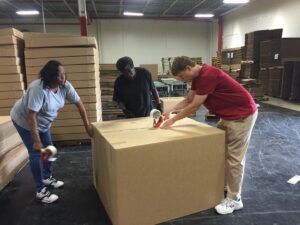Holding a job is something I’ve done since I was 13. My first job was a dishwasher at my dad’s “delicasea” store. What’s that you say? It was a ground-breaking concept when my father’s seafood business in Milwaukee, WI expanded to market fresh and frozen fish, carry-out fish dinners and even live lobster. Many a teenager received his or her first work experience preparing Friday fish fries, icing down display cases, or like me, washing greasy pans.
I fondly remember opening my first paycheck and feeling the gratification of being paid for my hard work and adding a good chunk of it to my savings account. Early in life I was looking forward to the day I would be on my own.
We need to recover this inner drive in young people today. Too many are being sheltered by their parents or are hemmed in by fear of the unknown. I know the economy is still recovering and it’s a challenge to earn enough moula to buy groceries and pay the rent. But it really wasn’t much different when I grew up. Milk was expensive, we had to clip coupons, and be on the lookout for bargains.
During the era of muscle cars, guys needed jobs to pay for gas and buy cars. Today, it’s more like money to buy the X-box and pay for Netflix. The key to everything in life is independence. Moving out of the parents’ guest bedroom is a good start.
This inner drive and motivation is just as important for people with special needs, including cognitive disabilities. Exactly how much they are working and what jobs they are doing may be different that their more abled peers. But having a job provides more than a paycheck; it gives them self-worth.
People with autism are especially gifted for certain jobs requiring close details. They also are dependable workers and many of them will benefit from having structure and interaction with other humans on this planet. Isolation and lying in bed is not a good thing.
Employers need not fear people with disabilities. Rather embrace them (not literally) and see how they will complement the workplace. Often retail customers will frequent a business that employs a diverse workforce, including folks with intellectual or other challenges. And a reasonable accommodation could be something as simple as a checklist.
We are all made to work. God has been working since the dawn of creation. One of most satisfying experiences I’ve had in placing people with intellectual/developmental disabilities was taking a young man with Down syndrome home after his first day on his first job. Asked what he thought about the job, he smiled and said with his slight stutter “I re-really like to work.”



